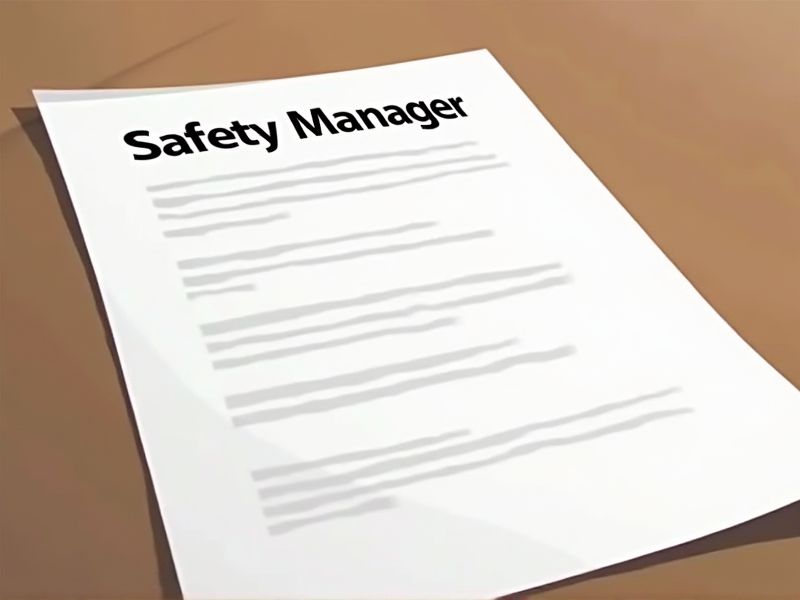
A Safety Manager's responsibilities extend to ensuring compliance with regulatory standards and safeguarding the well-being of employees. Certifications validate a manager's knowledge and expertise, demonstrating a clear understanding of safety protocols, hazard assessments, and emergency response planning. Acquiring these credentials can enhance trust from both employers and employees, signifying a commitment to upholding high safety standards. Here are some important certifications you might need as a Safety Manager.
Certified Safety Professional (CSP)
A Certified Safety Professional (CSP) designation often results in improved credibility and recognition in the field, enhancing a Safety Manager's authority and influence within an organization. The certification process provides comprehensive training that equips Safety Managers with up-to-date knowledge on regulations and best practices. CSPs are statistically more effective at identifying and mitigating workplace hazards, which can lead to a reduction in workplace accidents and injuries. Achieving CSP status can also correlate with higher salary potentials and better job prospects, reflecting the specialized skills and dedication of certified professionals.
Associate Safety Professional (ASP)
An Associate Safety Professional (ASP) certification ensures a safety manager possesses validated knowledge of safety concepts and regulations. Holding this certification often leads to improved compliance with safety laws, reducing the likelihood of workplace accidents and associated costs. Employers recognize ASP holders as individuals committed to high safety standards, potentially improving organizational safety culture. The ASP credential can enhance career prospects, often leading to higher trust and increased responsibilities.
Occupational Health and Safety Technologist (OHST)
Employing an Occupational Health and Safety Technologist (OHST) enhances a Safety Manager's ability to identify and mitigate workplace hazards effectively. The OHST's specialized knowledge ensures compliance with health and safety regulations, thereby reducing legal and financial risks for the organization. By leveraging OHST expertise, Safety Managers can implement more robust safety protocols, leading to decreased accident rates. OHST professionals also offer valuable insights into safety training programs, improving overall workforce awareness and engagement.
NEBOSH General Certificate in Occupational Health and Safety
The NEBOSH General Certificate is essential for Safety Managers because it provides a comprehensive understanding of health and safety regulations and practices, which is crucial for ensuring workplace safety standards. It equips them with the knowledge to effectively assess risks and implement appropriate safety measures, minimizing the likelihood of accidents. Possessing this certification demonstrates a commitment to professional development and can enhance a Safety Manager's credibility within the organization. Companies often require the qualification to ensure their safety personnel are well-trained to handle potential workplace hazards proficiently.
OSHA 30-Hour General Industry Certification
The OSHA 30-Hour General Industry Certification equips safety managers with the knowledge to identify potential workplace hazards. Understanding regulatory compliance standards helps ensure that safety protocols align with federal guidelines. Enhanced risk management skills result from the in-depth training provided by this certification. Employees can be more safeguarded through informed decision-making, contributing to a safer work environment.
ISO 45001 Lead Auditor Certification
ISO 45001 Lead Auditor Certification equips Safety Managers with the expertise to assess and improve occupational health and safety management systems effectively. This certification ensures that Safety Managers are well-versed in identifying potential hazards and implementing corrective measures. Organizations tend to prefer or require certified professionals because it demonstrates a commitment to international safety standards and regulatory compliance. Certified Safety Managers often contribute to reducing workplace incidents, enhancing employee morale and increasing operational efficiency.
Certified Industrial Hygienist (CIH)
A Certified Industrial Hygienist (CIH) provides specialized knowledge in identifying, evaluating, and controlling workplace hazards, directly enhancing a Safety Manager's ability to maintain a safe environment. Their expertise aids in adhering to regulatory standards, reducing the risk of non-compliance and potential penalties. They offer insights into exposure assessment and risk management, fostering a more comprehensive safety strategy. Collaborating with a CIH allows for tailored training programs, improving safety culture and employee health outcomes.
Certified Professional Ergonomist (CPE)
A Certified Professional Ergonomist (CPE) helps a Safety Manager design work environments that reduce the risk of musculoskeletal disorders among employees, promoting overall workplace health. The expertise of a CPE enables the assessment of ergonomic risks, which can lead to more effective injury prevention strategies and decreased worker compensation costs. By integrating ergonomic principles, a Safety Manager can enhance productivity, as employees are less likely to experience fatigue and discomfort. The involvement of a CPE ensures compliance with ergonomic regulations, reducing potential legal liabilities for the organization.
Construction Health and Safety Technician (CHST)
Construction Health and Safety Technicians (CHST) bring specialized knowledge that enhances the safety protocols on construction sites, ensuring compliance with regulatory standards. Their expertise in hazard identification and risk assessment is essential for preventing accidents and reducing workplace injuries. By collaborating with Safety Managers, CHSTs streamline safety training and promote a culture of safety consciousness among workers. This collaboration ultimately contributes to improved project timelines and cost management by minimizing disruptions caused by safety incidents.
Emergency Management Institute (EMI) Certification
EMI Certification equips a Safety Manager with essential knowledge and skills to handle disasters effectively, ensuring preparedness and mitigating risk. It enhances the credibility and confidence in decision-making processes, which is crucial during emergencies. Certified Safety Managers demonstrate a commitment to industry standards, improving compliance and organizational safety protocols. This certification often leads to better cooperation and coordination with other emergency response agencies.
Summary
When you, as a Safety Manager, acquire relevant certifications, your expertise and credibility in the field significantly increase. This enhancement in qualifications often leads to improved safety protocols and procedures within your organization. As a direct result, the workplace experiences a reduction in accident rates and associated costs. Colleagues and management also tend to trust and rely more on your expertise for safety-related decisions.
